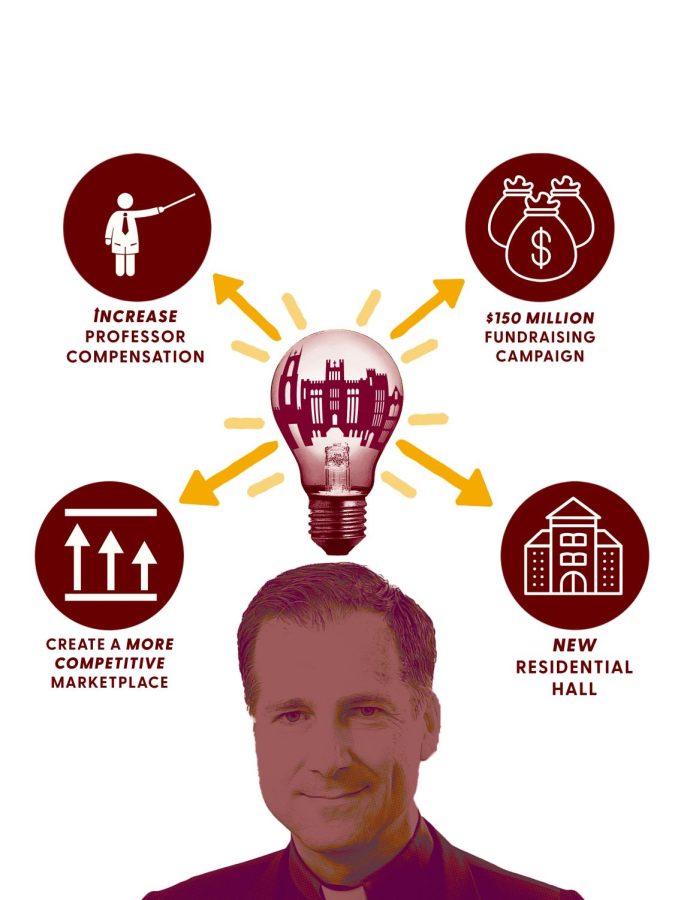University’s interim president shares plans to improve Loyola
Infographic of Loyola University’s new expansion plan.
January 26, 2023
Several changes are on the way to Loyola’s campus and community, according to interim president the Rev. Justin Daffron, S.J. at a town hall meeting on Dec. 8.
Daffron discussed several new initiatives at the meeting that he and his administration have developed to make the university more competitive with other institutions.
These initiatives include a broad compensation package for Loyola faculty that would be rolled out over the next three years, a new residential hall to be completed by 2025, and a multi-million dollar fundraising campaign that will help fund new projects across campus.
Daffron also enlisted a panel of experts to advise his administration on different ways he can create a more competitive marketplace for students and faculty. The ideas included partnering with other schools to reduce costs in areas such as human resources and information technology.
“We’ve had some internal discussions, but are still in the ideation phase of what might inspire further change at Loyola,” said Daffron.
Funding Campaign
At the town hall meeting, Daffron said that most of the funding for these plans is expected to come from an ambitious fundraising campaign that will provide a $150 million investment in Loyola, and further outlined the three categories of investment: mind, body, and spirit.
Daffron said that $85 million will be allotted to the mind portion of the campaign.
“The campaign will provide investments in academics for faculty research and endowed professorships,” he said.
Daffron and the board of trustees said they plan to establish a “Faculty-Staff Excellence Fund” to reward the work of faculty and staff.
$30 million of the original $150 million investment will go toward the body portion of the campaign, Daffron said. This would include upgrades to existing buildings on campus, such as residential halls, athletic facilities, and general campus improvements.
$35 million will be raised to invest in the Jesuit, Catholic identity, as well as in diversity, equity, and inclusion in support of the spirit portion of this campaign, according to Daffron.
However, Loyola’s administration offered no clear answers when asked where this money would specifically go and what investing in these criteria means.
Compensation Increase
As part of the new compensation plan, Daffron has proposed cost of living adjustments, retirement contributions, and addressing gaps discovered by a compensation study the university commissioned in 2021. While the study’s results remain confidential, Daffron said they will help create “pay structures that are both competitive in the marketplace and equitable for all employees.”
However, the administration acknowledged that they won’t be able to fix every gap identified in the study immediately.
Last September, The Maroon reported the average wage for all full-time faculty and staff at Loyola was 25% lower than the national average in higher education. Daffron’s compensation plan seeks to quell professor concerns about an increase in salary, which many professors said they feel is long overdue.
Daffron told The Maroon that his administration had already begun to address some of these gaps last spring, with the lowest paid employees being awarded a one-time bonus. As of September of last year, Daffron said Loyola issued $1.4 million in one-time payments to 212 employees identified as receiving compensation below the target range for their position.
Daffron and the leadership team said they hope that by fixing the gaps discovered in the compensation study, Loyola will become a “go-to place” for workers in the region. Daffron also said that a new compensation plan will help promote professional development and a healthier work-life balance.
New Residential Hall
Another major plan discussed by Daffron’s administration was the goal to complete construction of a new residential hall by 2025. The new hall will become the largest on campus with a 600-bed occupancy, Daffron said.
In his town hall address, Daffron said that the “quality of residence halls has been a barrier to some students choosing Loyola.”
The new residential hall is an attempt to increase applicant appeal, revenue, and offer room to fix other buildings on campus. Daffron said he hopes this will help support his administration’s broader enrollment strategies.
“All five existing residence halls are scheduled for improvements, with the most extensive renovations planned for Biever Hall and Founders Hall,” Daffron said.
Daffron previously said at the town hall meeting that he hoped for a specific timeline by January, however, he still has not provided a timeline for compensation plan, fundraising campaign, or other projects outside of the residential hall construction and renovations.








